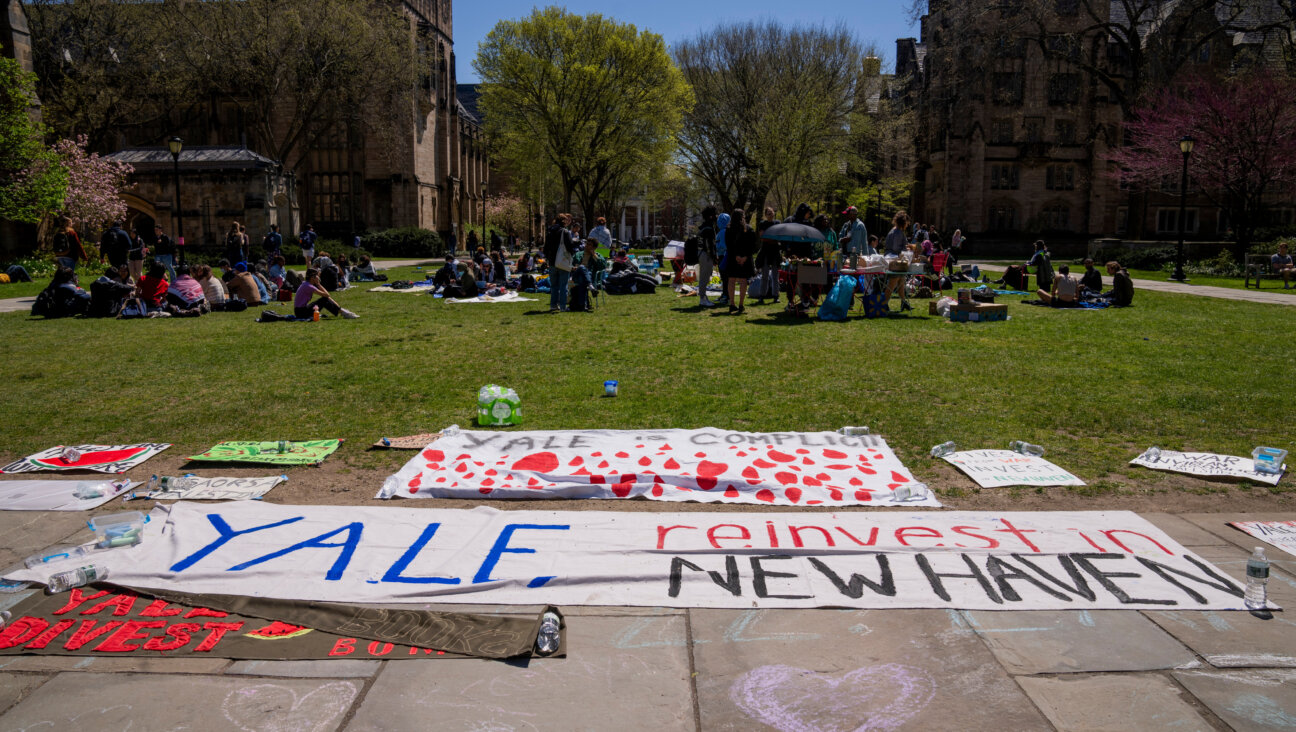First Sudanese Asylum Seeker Granted Refugee Status in Israel

Israel granted refugee status to a Sudanese asylum seeker for the first time on Thursday.
Mutasim Ali was given Israeli residency seven years after he fled to Israel from Darfur. Ali is the executive director of the African Refugee Development Center, which advocates for the tens of thousands of Sudanese and Eritrean asylum seekers living Israel without legal status in the country.
“It is really an emotional moment,” Ali told the Forward. “I have to thank the state of Israel for giving me this status and allowing me to have a dignified life.”
Ali said that he spent a combined 18 months in Holot and Saharonim, two detention centers in the Negev desert where Israel holds African asylum seekers without charge. He now lives in Tel Aviv.
In addition to Ali, four other asylum seekers, all from Eritrea, have refugee status in Israel. According to Human Rights Watch, 63,000 Africans crossed into Israel before it sealed its border with Egypt in 2012. While other democracies accept Sudanese and Eritreans as refugees, the Israeli government has refused to process asylum cases, leaving the asylum seekers in limbo without basic social services like healthcare, and under constant threat of detention. Several thousand Sudanese have returned to their homeland, where they face torture, detention and treason charges for having lived in Israel.
According to Ministry of Interior figures, as of March there are now 8,332 Sudanese and 30,549 Eritreans in Israel.
Elliot Vaisrub Glassenberg, an activist with the Right Now Coalition, an Israeli human rights group focused on African asylum seekers, said it was too soon to tell whether Ali’s case would set a new precedent for other Eritreans and Sudanese in Israel.
“On the one hand it would appear to be precedent setting since [Ali] is the first Sudanese person to receive asylum,” he said. “On the other hand refugee cases are supposed to be determined individually. One person’s case does not reflect another person’s case.”
Ali grew up in Darfur, in west Sudan. He became a human rights activist for Darfur as a student studying geology at the University of Obdurman, according to a biography provided by the Israeli group Hotline for Refugees and Migrants. During his studies, his family’s village was burned by regime-backed militias and Ali’s parents fled to northern Darfur to an camp for internally displaced persons. They are still there today.
Ali was arrested for his activism with the Sudanese Liberation Movement and was placed without trial in solitary confinement and tortured, according to Hotline. He fled to Israel in 2009 and was detained for several months.
“I am here because of the genocide committed by Sudanese government against Darfuris and I had to escape in order for me to survive,” Ali said at a public speech at Ben Gurion University TED conference.
Ali has been trying to acquire refugee status since his arrival in Israel, and was able to successfully submit an application to the Ministry of Interior in 2012. In 2014 he was sent to the Holot detention facility. He was freed after human rights groups appealed for his release to the High Court of Justice. Now, Ali’s long battle for refugee status is over.
“The Ministry of Interior informed Mutasim Ali’s lawyer, [Advocate] Assaf Weitzen of the Hotline for Refugees and Migrants, that the Minister of Interior, Arye Deri, has accepted the recommendation of the Advisory Committee on Refugees and granted Ali refugee status,” Hotline said in a statement.

Mutasim Ali and his lawyer, Assaf Weitzen
A phone call to a spokesperson at the Ministry of Interior was not immediately returned.
Ali said that he is hopeful that his case will lead the way for others in similar positions.
“I really hope that this can be an opportunity to think of alternative policies to what we have today.”
Contact Naomi Zeveloff at [email protected] or on Twitter @NaomiZeveloff

I hope you appreciated this article. Before you go, I’d like to ask you to please support the Forward’s award-winning journalism this Passover.
In this age of misinformation, our work is needed like never before. We report on the news that matters most to American Jews, driven by truth, not ideology.
At a time when newsrooms are closing or cutting back, the Forward has removed its paywall. That means for the first time in our 126-year history, Forward journalism is free to everyone, everywhere. With an ongoing war, rising antisemitism, and a flood of disinformation that may affect the upcoming election, we believe that free and open access to Jewish journalism is imperative.
Readers like you make it all possible. Right now, we’re in the middle of our Passover Pledge Drive and we still need 300 people to step up and make a gift to sustain our trustworthy, independent journalism.
Make a gift of any size and become a Forward member today. You’ll support our mission to tell the American Jewish story fully and fairly.
— Rachel Fishman Feddersen, Publisher and CEO
Join our mission to tell the Jewish story fully and fairly.
Only 300 more gifts needed by April 30

























